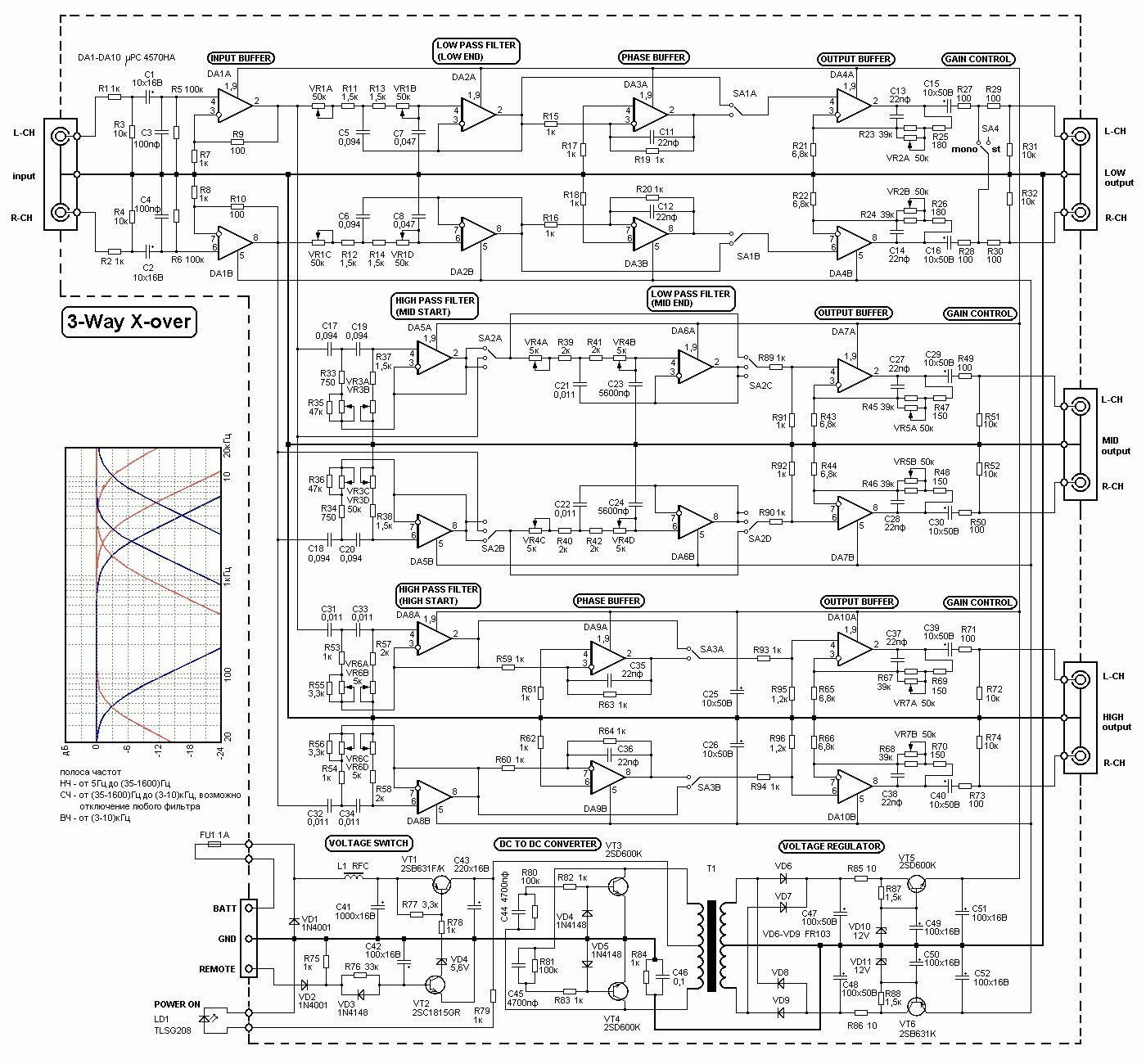Active three-way crossover. Encyclopedia of radio electronics and electrical engineering

Encyclopedia of radio electronics and electrical engineering / Tone, volume controls
 Comments on the article
Comments on the article

(click to enlarge)
Publication: cxem.net
 See other articles Section Tone, volume controls.
See other articles Section Tone, volume controls.
 Read and write useful comments on this article.
Read and write useful comments on this article.
<< Back
 Latest news of science and technology, new electronics:
Latest news of science and technology, new electronics:
Energy from space for Starship
08.05.2024
Producing solar energy in space is becoming more feasible with the advent of new technologies and the development of space programs. The head of the startup Virtus Solis shared his vision of using SpaceX's Starship to create orbital power plants capable of powering the Earth. Startup Virtus Solis has unveiled an ambitious project to create orbital power plants using SpaceX's Starship. This idea could significantly change the field of solar energy production, making it more accessible and cheaper. The core of the startup's plan is to reduce the cost of launching satellites into space using Starship. This technological breakthrough is expected to make solar energy production in space more competitive with traditional energy sources. Virtual Solis plans to build large photovoltaic panels in orbit, using Starship to deliver the necessary equipment. However, one of the key challenges ... >>
New method for creating powerful batteries
08.05.2024
With the development of technology and the expanding use of electronics, the issue of creating efficient and safe energy sources is becoming increasingly urgent. Researchers at the University of Queensland have unveiled a new approach to creating high-power zinc-based batteries that could change the landscape of the energy industry. One of the main problems with traditional water-based rechargeable batteries was their low voltage, which limited their use in modern devices. But thanks to a new method developed by scientists, this drawback has been successfully overcome. As part of their research, scientists turned to a special organic compound - catechol. It turned out to be an important component that can improve battery stability and increase its efficiency. This approach has led to a significant increase in the voltage of zinc-ion batteries, making them more competitive. According to scientists, such batteries have several advantages. They have b ... >>
Alcohol content of warm beer
07.05.2024
Beer, as one of the most common alcoholic drinks, has its own unique taste, which can change depending on the temperature of consumption. A new study by an international team of scientists has found that beer temperature has a significant impact on the perception of alcoholic taste. The study, led by materials scientist Lei Jiang, found that at different temperatures, ethanol and water molecules form different types of clusters, which affects the perception of alcoholic taste. At low temperatures, more pyramid-like clusters form, which reduces the pungency of the "ethanol" taste and makes the drink taste less alcoholic. On the contrary, as the temperature increases, the clusters become more chain-like, resulting in a more pronounced alcoholic taste. This explains why the taste of some alcoholic drinks, such as baijiu, can change depending on temperature. The data obtained opens up new prospects for beverage manufacturers, ... >>
 Random news from the Archive Random news from the Archive Does a foreign language help you think?
18.01.2015
We often hear that learning foreign languages improves cognitive abilities. Last year, for example, we wrote about a study by employees of the University of Edinburgh (Great Britain), who found out that a foreign language stimulates attention and helps to concentrate; moreover, the cognitive effect happens regardless of whether you started learning the language in early childhood or after school. And this is just one of the huge number of works that say that - yes, the knowledge of several languages is only good for the intellect.
However, one feature emerged here. Angela de Bruin of the University of Edinburgh has noticed that in private conversations with those who study the influence of a second language on intelligence, one can hear about results that do not support the theory of "cognitive benefit" and which are then not included in publications. For example, there is evidence that bilingualism helps to concentrate attention, not be distracted by extraneous stimuli when we are busy with something - and there is other evidence that not only contradicts the hypothesis, but does not fit into it. Such information is not hushed up, they are not hidden, they simply remain in the archives and are not included in the publication.
Why is this happening? One of the reasons is the inertia of thinking and fashion, which, unfortunately, also take place in science. Angela de Bruyne and her colleagues analyzed more than a hundred reports on the influence of a foreign language on cognitive abilities, which were presented at various conferences from 1999 to 2012. Then these same reports were compared with how many of them reached publication in an international scientific journal.
As the authors of the study write in their article in Psychological Science, 38% of scientific reports described experiments that confirmed the hypothesis of the cognitive advantage of a second language, 13% had indeterminate results that said the hypothesis “more likely than not”, another 32% said “rather no than yes", and, finally, 16% of the works claimed that the hypothesis of the beneficialness of the second language for the brain is not true.
Half of the reports were published, and most of the data accepted for publication (63%) spoke to some extent about the benefits of bilingualism. Of those that questioned this hypothesis, only 36% were published. Here one might assume that studies with a negative result were not very reliable, for example, they relied on insufficient statistics. However, de Bruyne and his colleagues specifically emphasize that such a bias is not related to the methodological features of the "negative" works.
The reason, most likely, lies in the psychology of both the experimenters themselves and the journal reviewers - both of them may give preference to those data that speak in favor of the cognitive benefits of a foreign language. As a result, everyone gets the impression that the hypothesis is absolutely proven (since a scientific article has a higher status than a report at a conference), although if you take the whole set of data on the problem, this impression can be greatly shaken. There is only one general conclusion from this: it is necessary to follow as closely as possible those areas of science that are of increased public interest, whether in psychology or molecular biology, and regularly conduct such sanitary scientific research in them with a complete analysis of the accumulated data.
|
 Other interesting news:
Other interesting news:
▪ New S5H1406 Chip for Digital TV Receiver
▪ A new way to pasteurize milk
▪ Nanotube heatsinks
▪ Motherboards based on the H81 chipset from Gigabyte
▪ Stem cells in the shell
 News feed of science and technology, new electronics
News feed of science and technology, new electronics
 Interesting materials of the Free Technical Library:
Interesting materials of the Free Technical Library:
▪ section of the site Audio and video surveillance. Selection of articles
▪ article Brutal soldier. Popular expression
▪ article What is peat? Detailed answer
▪ article Bayonet knot. Travel Tips
▪ article Improvement of the active indoor KB antenna. Encyclopedia of radio electronics and electrical engineering
▪ article High-frequency power supply for a fluorescent lamp. Encyclopedia of radio electronics and electrical engineering
 Leave your comment on this article:
Leave your comment on this article:
 All languages of this page
All languages of this page
Home page | Library | Articles | Website map | Site Reviews

www.diagram.com.ua
2000-2024







 Arabic
Arabic Bengali
Bengali Chinese
Chinese English
English French
French German
German Hebrew
Hebrew Hindi
Hindi Italian
Italian Japanese
Japanese Korean
Korean Malay
Malay Polish
Polish Portuguese
Portuguese Spanish
Spanish Turkish
Turkish Ukrainian
Ukrainian Vietnamese
Vietnamese

 Leave your comment on this article:
Leave your comment on this article: